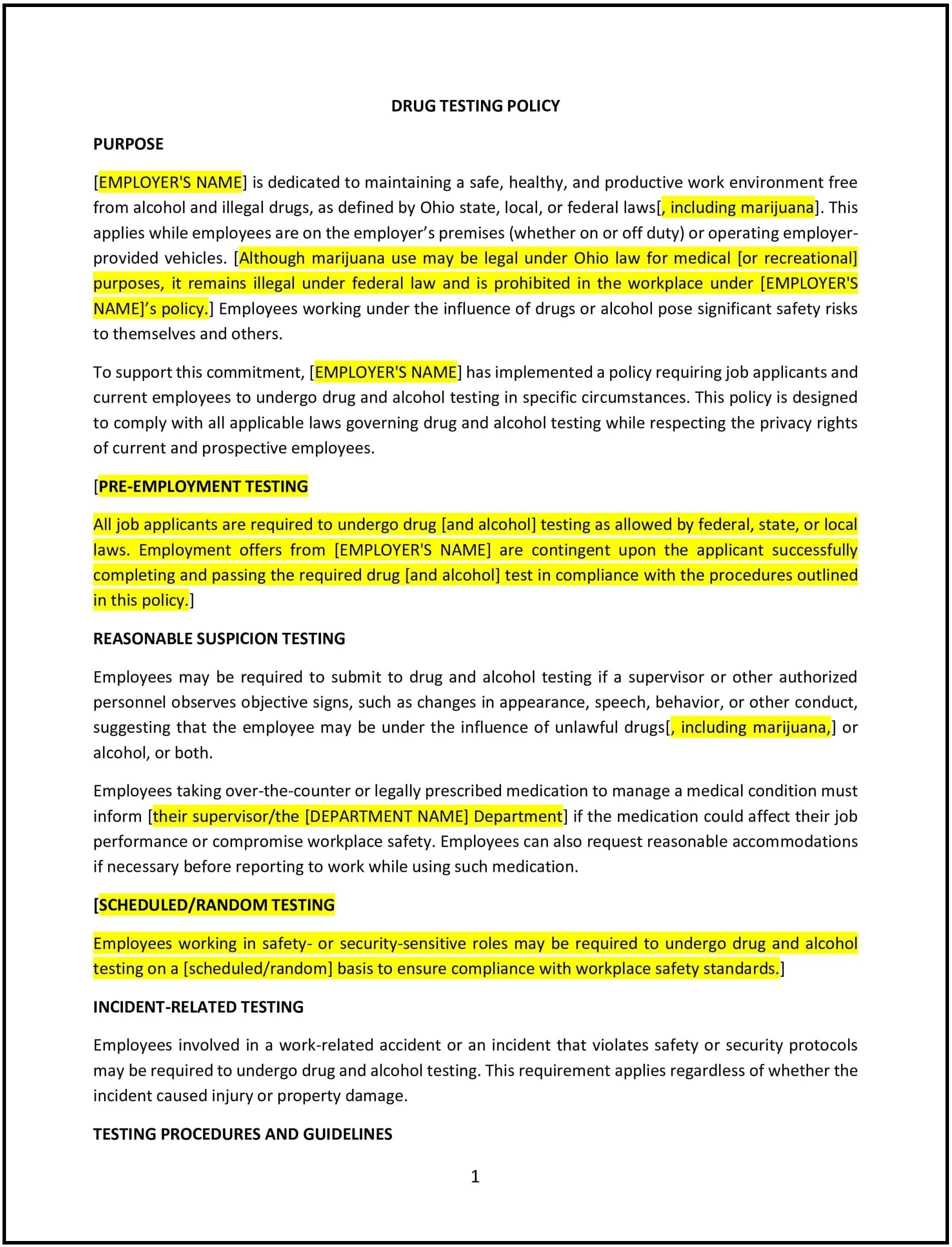Got contracts to review? While you're here for policies, let Cobrief make contract review effortless—start your free review now.

Customize this template for free
Drug testing policy (Ohio)
A drug testing policy provides Ohio businesses with clear guidelines for conducting drug tests on employees and applicants. This policy aims to ensure a safe, productive, and drug-free work environment while complying with Ohio state laws and federal regulations. It defines when and how drug tests will be conducted, the substances being tested for, and the process for handling test results. The policy also outlines the procedures for dealing with positive test results, including potential disciplinary actions and options for rehabilitation or assistance programs.
By implementing this policy, Ohio businesses can promote workplace safety, reduce the risk of accidents or injuries, and demonstrate a commitment to maintaining a drug-free workplace.
How to use this drug testing policy (Ohio)
- Define the scope of drug testing: The policy should specify which employees and job applicants are subject to drug testing. It should outline whether drug testing will apply to all employees, specific positions (e.g., safety-sensitive jobs), or only in certain circumstances, such as after an accident or as part of a pre-employment process.
- Identify the types of tests conducted: The policy should outline the different types of drug tests that may be administered, such as urine, hair, saliva, or blood tests, and specify the substances being tested for (e.g., marijuana, cocaine, opiates, amphetamines, etc.).
- Specify testing circumstances: The policy should specify when drug testing may occur, such as during pre-employment, random testing, post-accident, or if there is reasonable suspicion of drug use.
- Outline the approval process: The policy should clarify how drug testing will be initiated, who is responsible for conducting or coordinating the testing, and how employees will be notified.
- Explain consequences of positive results: The policy should clearly define the consequences of testing positive for drugs, including possible disciplinary actions such as suspension, termination, or mandatory rehabilitation.
- Address confidentiality: The policy should ensure that all drug test results will be kept confidential and shared only with those who need to know, in accordance with Ohio state laws and the Health Insurance Portability and Accountability Act (HIPAA).
- Offer support for rehabilitation: The policy should outline the steps the business will take to support employees who test positive, such as offering access to an Employee Assistance Program (EAP) or providing a chance for rehabilitation before disciplinary action is taken.
- Ensure compliance with Ohio state and federal laws: The policy should comply with Ohio state laws and federal regulations, including the Drug-Free Workplace Act and relevant Occupational Safety and Health Administration (OSHA) guidelines.
- Regularly review and update: The policy should be reviewed periodically to ensure it remains in line with changes in Ohio state laws, federal regulations, and best practices related to drug testing.
Benefits of using this drug testing policy (Ohio)
This policy provides several key benefits for Ohio businesses:
- Promotes workplace safety: Drug testing helps prevent workplace accidents and injuries that may occur due to impaired performance, especially in safety-sensitive positions.
- Ensures compliance with regulations: By adhering to Ohio state laws and federal drug testing regulations, businesses reduce the risk of legal challenges and non-compliance penalties.
- Enhances productivity: A drug-free workplace fosters a more focused, reliable, and efficient workforce, leading to higher productivity and job satisfaction.
- Reduces absenteeism: Implementing drug testing can help identify and address substance abuse issues early, reducing absenteeism and the impact of impaired employees on business operations.
- Demonstrates commitment to employee well-being: Offering support and rehabilitation options for employees who test positive for drugs shows a commitment to the well-being of staff, encouraging healthier habits and improving employee retention.
- Protects business reputation: Maintaining a drug-free workplace reduces the risk of incidents that could damage the business’s reputation, such as workplace accidents or legal issues related to drug use.
- Helps maintain a fair and consistent work environment: A clear drug testing policy ensures that all employees are held to the same standards, fostering fairness and consistency in the workplace.
Tips for using this drug testing policy (Ohio)
- Communicate the policy clearly: Ensure that all employees are aware of the drug testing policy by including it in the employee handbook, discussing it during onboarding, and providing training on the expectations for a drug-free workplace.
- Ensure confidentiality: Maintain strict confidentiality around drug test results and ensure that only authorized personnel have access to this information.
- Implement consistent enforcement: Ensure the policy is enforced consistently and fairly across all departments to avoid any perception of bias or discrimination.
- Provide rehabilitation resources: Offer employees access to rehabilitation services or an Employee Assistance Program (EAP) to support those who may have substance abuse issues.
- Be transparent about testing procedures: Clearly explain how drug testing will be conducted, the substances being tested for, and what will happen in the event of a positive result.
- Review and update regularly: Regularly review and update the policy to ensure it reflects changes in Ohio state laws, federal regulations, and evolving best practices for drug testing and workplace safety.